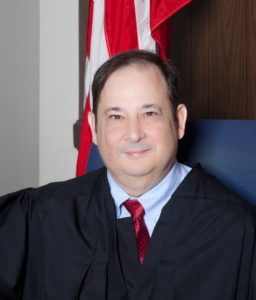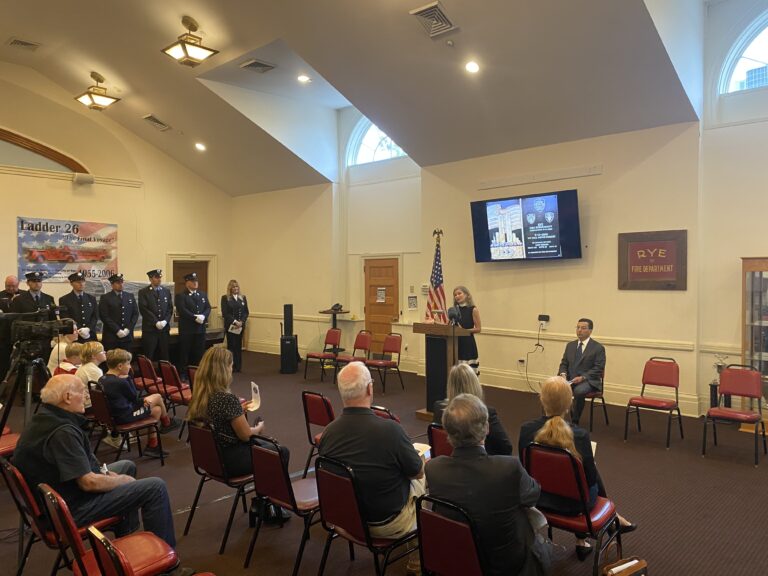Holding Court: Search Me
Holding Court is a new series by retired Rye City Court Judge Joe Latwin. Latwin retired from the court in December 2022 after thirteen years of service to the City.
What topics do you want addressed by Judge Latwin? Tell us.
By Joe Latwin

The right of the people to be secure in their persons, houses, papers, and effects, against unreasonable searches and seizures, shall not be violated,…. FOURTH AMENDMENT to the U.S. CONSTITUTION. Unlike most other Constitutional provisions, the Fourth Amendment contains a weasel word that can be the subject of interpretation – reasonable. What is reasonable under the circumstances depends on the circumstances.
If a search is unreasonable, it is illegal and the fruits of the illegal search may not be admitted into evidence. Let’s look at the typical situation. Police stop someone and perform a search. During the search, police find drugs, a gun, the murder weapon or some other contraband. The person is arrested and charged with a crime based upon the evidence uncovered by the search. The person either seeks to have the evidence excluded at trial or argues on appeal from the conviction, that the search was improper and the evidence should not have been admitted.
In 1976, New York’s highest court established a four-tiered framework – the De Bour framework – for evaluating the propriety of police-initiated encounters with civilians. It has proved a difficult framework to use and is considered unworkable by many. The Court of Appeals had the chance to revisit the De Bour framework.
In 2015, two Officers were patrolling an area that had recently experienced a reported rise in violent crime. Both officers were in uniform and were riding in a marked vehicle. As they drove up the street, one Officer noticed a parked SUV about fifty feet ahead. There is no indication that the car was parked improperly or that it was otherwise violating any vehicle or traffic laws. The Officer saw the vehicle’s only occupant, Mr. Johnson, move from the driver’s seat to the passenger seat. As he approached the car, the Officer saw Mr. Johnson momentarily move his upper body back toward the driver’s seat. The Officer stopped his patrol car behind Mr. Johnson’s car and turned on the overhead lights (not the emergency lights), so he could better see into Mr. Johnson’s vehicle. Nothing suggested that Mr. Johnson was aware of the presence of the police when the police car stopped or when the turned on the overhead lights.
The Officer and Mr. Johnson exited their respective vehicles. The Officer noticed that Mr. Johnson’s pants were unbuttoned, his belt undone, and that he was trying to pull his pants up as he walked down the street. The Officer asked Mr. Johnson to hold up, but Mr. Johnson continued to walk away. When the Officer caught up to Mr. Johnson, he asked whether Mr. Johnson was nervous; Mr. Johnson replied that he was not. The Officer asked whether Mr. Johnson had any weapons on him, to which Mr. Johnson replied, “Nothing”. The Officer then frisked Mr. Johnson—finding no weapon. During the frisk, the Officer felt an object in Mr. Johnson’s pocket he thought might be a bag of drugs. He asked Mr. Johnson what was in his pockets and Mr. Johnson replied, “Nothing”. According to the Officer, Mr. Johnson began emptying his pockets, throwing two bags of marijuana on the ground. He also noticed that Mr. Johnson was holding a clear bag in his fist containing what appeared to be heroin. The Officer placed Mr. Johnson under arrest.
Mr. Johnson unsuccessfully moved to suppress the drugs found on him as the fruits of an illegal search and seizure. Nevertheless, he was convicted of drug charges. On appeal, he contends that the police did not have the requisite level of suspicion to justify a search.
At the suppression hearing, the Officer testified that he thought it was not “common” for someone to move from the driver to the passenger seat of a car and that Mr. Johnson’s moving his upper torso back toward the driver’s seat meant there was “potential” that Mr. Johnson could be trying to stash or retrieve a weapon. He also considered it suspicious that Mr. Johnson was pulling up his pants and attempting to buckle his belt because suspects commonly hide weapons in their waistband.
Under the De Bour framework, at the first level, law enforcement may engage in minimally-intrusive questioning to request information “when there is some objective credible reason for that interference not necessarily indicative of criminality”. The second level—the common-law right of inquiry—permits officers “to gain explanatory information, … short of a forcible seizure” upon a “founded suspicion that criminal activity is afoot”. The third level, “a forcible stop and detention,” requires the “officer entertain[ ] a reasonable suspicion that a particular person has committed, is committing or is about to commit a felony or misdemeanor,” and “[a] corollary of the statutory right to temporarily detain for questioning is the authority to frisk if the officer reasonably suspects that [they are] in danger of physical injury by virtue of the detainee being armed” “Finally[,] a police officer may arrest and take into custody a person when [the officer] has probable cause to believe that person has committed a crime, or offense in [the officer’s] presence”.
Was the search and seizure proper and the evidence of the drugs properly admitted, or should they have been suppressed? On May 18, 2023, the Court of Appeals answered these questions. What would you have done? What did the Court of Appeals do?
Post your comment below!





